
US steel imports slipped in August after rising in July
July represents the second-lowest monthly rate for steel imports so far this year.

July represents the second-lowest monthly rate for steel imports so far this year.
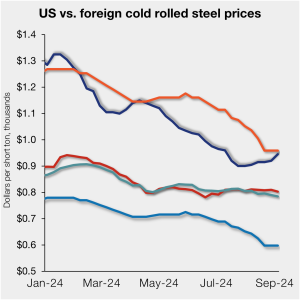
The price gap between US cold-rolled (CR) coil and offshore product has widened again. The premium has grown repeatedly since falling to a 10-month low in late July.
Sheet prices didn’t roar back after Labor Day. But steel market news sure came out of the gate strong (or maybe chaotically is the better way to put it). First, the nearly $15-billion proposed sale of U.S. Steel to Nippon Steel exploded into the news. And when I say exploded, I mean that all sides seem to be escalating things now.
US mills have filed or soon will file a sprawling trade petition against imports of coated flat-rolled steel from 10 countries. The petition seeks anti-dumping margins against Canada, Mexico, Brazil, the Netherlands, Turkey, the United Arab Emirates, Vietnam, Taiwan, Australia, and South Africa. It also seeks countervailing duty margins against Canada, Mexico, Brazil, and Vietnam. That’s according documents dated Sept. 5 and addressed to Commerce Secretary Gina Raimondo and International Trade Commission (ITC) Secretary Lisa Barton.
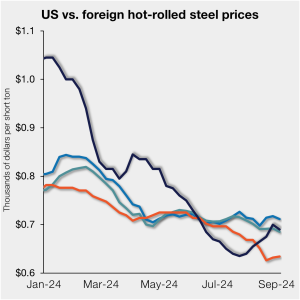
US hot-rolled (HR) coil prices were largely flat over the past week, remaining higher than tags for offshore material on a landed basis for a second consecutive week.
Welcome back from Labor Day, from Steel Summit, and from whatever fun you might have had over the long weekend. Personally, I enjoyed camping with friends and family near Starved Rock. No one starved, there were no major injuries, and we enjoyed the many splendors of Mystical Fire. (Speaking of which, does that have industrial uses? But I digress.)
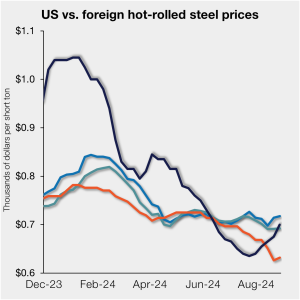
US hot-rolled (HR) coil prices continue to move higher, surpassing tags for offshore material on a landed basis. Domestic prices, improving on the heels of firmer US mill offers, pulled ahead of import tags as the stateside gains this week were sharper than the increases in overseas markets. SMU’s check of the market on Tuesday, […]
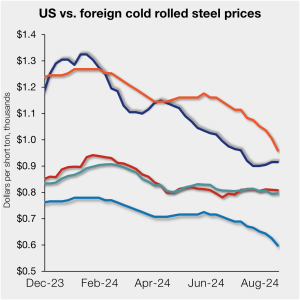
The price gap between US cold-rolled (CR) coil and imported CR has widened since falling to a 10-month low in late July.
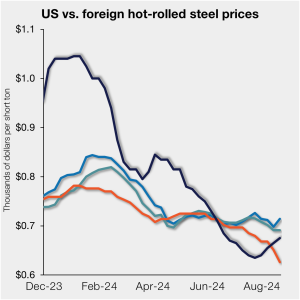
US hot-rolled (HR) coil prices continue to inch up and are now roughly even with prices for offshore material on a landed basis. The closing of the gap between cheaper US prices and more expensive import tags was driven by improving domestic prices on the heels of firmer US mill offers. SMU’s check of the […]
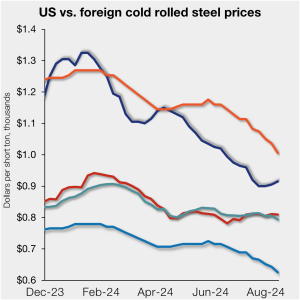
The price gap between US cold-rolled (CR) coil and imported CR widened this week after falling to a 10-month low in late July.
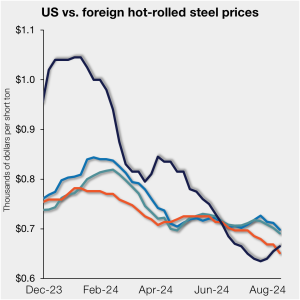
US hot-rolled (HR) coil prices are nearly even with prices for offshore material on a landed basis as domestic tags continue to inch up.

After nearing a two-year high in May, the volume of finished steel entering the US market (referred to as ‘apparent steel supply’) receded in June, according to SMU’s latest analysis of data from the Department of Commerce and the American Iron and Steel Institute (AISI).
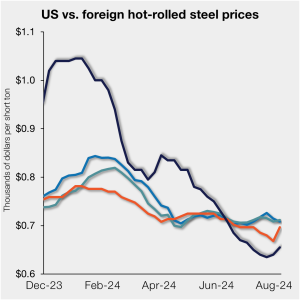
US hot-rolled (HR) coil remains cheaper than offshore material on a landed basis despite domestic tags inflecting upward lately. But the spread between domestic and foreign HR has tightened on the heels of price hikes by US mill over the past two weeks. (Visit SMU’s price increase calendar to keep track of the latest mill price announcements).

June steel import data was finalized at 2.15 million short tons (st) this week, down 24% from May according to the latest US Commerce Department release. June represents the lowest monthly import rate seen this year. July import licenses now tally up to 2.29 million st as of Aug. 4, potentially recovering 6% from June. […]
It might be the dog days of summer. But it’s been a newsy week for steel. Let’s start on the trade front, where we had a big decision in a case before the Commerce Department about Vietnam’s market status. Ethan Bernard covered the news. Commerce determined that Vietnam remained a “non-market economy,” or NME, based on factors such as government control over private property, labor conditions, and one-party rule. What’s also notable, and which Wiley trade attorney Alan Price points out in a good column on the matter, is that Commerce’s decision cannot be appealed.
The US Commerce Department on Friday released its determination confirming that the Socialist Republic of Vietnam continues to function as a non-market economy (NME). The department’s decision represents a significant victory for domestic manufacturing. It is also critical to leveling the playing field for US industries and will support greater opportunities for growth and fair trade in the United States. The government of Vietnam had requested that Commerce reconsider its NME designation. It argued that Commerce Secretary Gina Raimondo had pledged to support the changing of its status to a market economy.
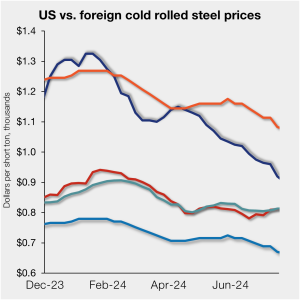
The price gap between US cold-rolled (CR) coil and imported CR tightened marginally after falling to a 10-month low in late July.
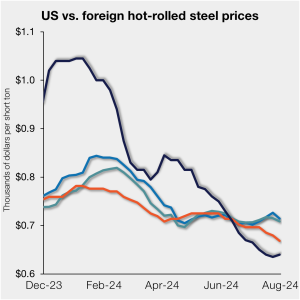
The premium between US hot-rolled (HR) coil and offshore hot band prices narrowed this week as it appears domestic tags might have reached a bottom.
Nucor has raised its consumer spot price (CSP) for hot-rolled (HR) coil to $675 per short ton (st), up $25/st from last week.
Six steel industry organizations have urged House Speaker Mike Johnson to include the Leveling the Playing Field 2.0 Act in any proposed package of legislation against China’s "unfair" trade practices.
Both iron ore and coking coal prices fell this week because of resistance from buyers. Iron ore prices have continued to fall throughout the past week, following sharp declines in steel prices in China, given no new policy announcement from the ‘Third Plenum’ meeting.
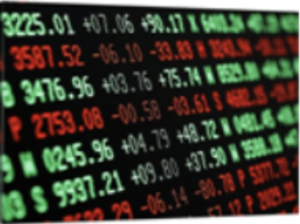
Summer is here, and a familiar sentiment has hit the hot-rolled coil (HRC) futures market. Prices continue to decline in both the spot market and the futures market, with expectations of sub-$800 prices for the remainder of the year.
Nucor has lowered the 2024 production estimate for its Brandenburg, Ky., plate mill due to soft market conditions.
High levels of steel imports, especially from China, in recent months are worrying steel makers in India and Vietnam.
Nucor’s top executive expressed concerns over unfair trade practices, highlighting increased steel imports from Mexico and Canada.
On Monday and Tuesday of this week, SMU polled steel buyers on an array of topics, ranging from market prices, demand, and inventories to imports and evolving market events.
Cleveland-Cliffs Chairman, President and CEO Lourenco Goncalves had some insightful things to say today about the steel market and about a conference we suspect might be Steel Summit.

SMU’s sheet price ranges slid again this week. But the declines were more pronounced on tandem products whereas prices for hot-rolled coil held roughly steady.
Cleveland-Cliffs’ earnings tumbled in the second quarter as the company cited weak demand and pricing.
Cleveland-Cliffs is starting a new electrical distribution transformer production plant in Weirton, W.Va.